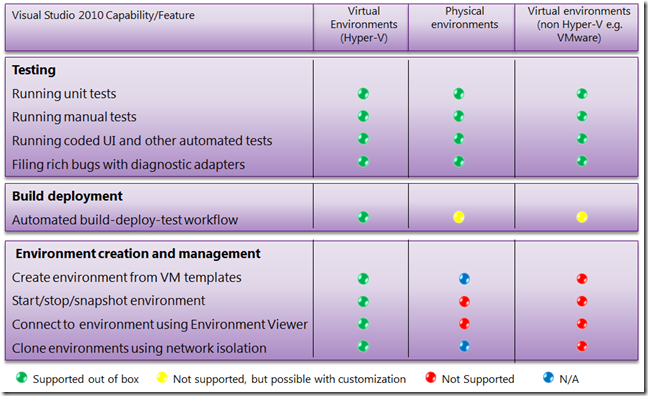Does Lab Management support non-Hyper-V platforms?
We get a lot of questions around the support matrix for Lab Management in TFS 2010 – does it only work for Hyper-V virtual machines or with physical machines too? Can I use it with my non-Hyper-V VMs?
I will first talk about the types of environments and the support for various capabilities of Lab Management, and finally summarize this with a table.
Types of environments:
Visual Studio 2010 supports 2 types of environments – virtual and physical, which you can create using the Microsoft Test Manager.
- A virtual environments is a collection of virtual machines (with network and other settings) running on Hyper-V hosts, managed by System Center Virtual Machine Manager.
- A physical environment is a collection of physical machines, on which you have installed the test agent. If you have virtual machines running on a non-Hyper-V platform, you can model them as physical machines in the system. This way, you will be able to get all the capabilities available for physical environments for the non-Hyper-V environments, but not the capabilities exclusively available for virtual environments. (refer the last section in the table below).
That said; let us look at each of the scenarios/capabilities a little more closely.
1. Testing
Using Microsoft Test Manager, you can run tests on both virtual as well as physical environments. The capabilities are exactly the same here and this means that you can run automated and manual tests, and do rich diagnostic data collection from all sorts of environments – Hyper-V, non Hyper-V, and physical.
2. Build deployment
You can easily automate the build-deployment-testing workflow on Hyper-V virtual environments using the template shipped in TFS 2010 (labdefaulttemplate.xaml).
For physical environments, such a template is not available out of the box. However, since this automation is based on Windows Workflow Foundation 4.0, you can customize the template (or create your own) using the activities in the toolbox, to automate build deployment and testing on physical machines. This means you can do the same for non-Hyper-V environments as well, however note that the virtual environment specific actions (restore to snapshot/start/stop environment) will not be available for physical and non-Hyper-V environments.
3. Environment creation and management
Creating virtual machines from a template, cloning environments using network isolation, VM operations such as Start/Stop/Snapshot/Pause are exclusively available for Hyper-V based virtual environments and not available for non-Hyper-V or physical environments.
Summary
To sum up and to answer the questions asked in the beginning, Visual Studio 2010 isn’t meant only to work with Hyper-V virtual environments. A lot of integration capabilities work for physical as well as for non-Hyper-V environments, as described in this post. Here is a table that summarizes these capabilities.
I hope this clarifies your doubts. In case you have further comments/questions, please leave a comment here or reach out to us using the msdn forum.
Comments
Anonymous
November 29, 2010
it was my understanding that VMWare would eventually be supported with features on par with Hyper Visor. Is this still the case? or have things changed and now this is as good as it will get?Anonymous
December 02, 2010
A great explanation, just what I was looking for! Thanks a lot.Anonymous
January 28, 2011
Will you be supporting other platforms via their management interfaces or through some of the LabManager tools that are offered? For example VMware has vCenter or LabManager and Citrix has VMLogix LabManager? If you supported VMLogix LabManager you would actually be able to support, Citrix, VMware and Hyper-V hosts from one platform. Thank you, Kevin Foster kefoster (at) gmail comAnonymous
February 09, 2011
Is there any extension api that I can use to implement a connector of TFS LabManagement to another virtualization solution? The number of operations and queries sent to the virtualization services of Hyper-V should be relative small, so that it would be possible to map such funtionality to other virtualization systems as well...Anonymous
March 28, 2011
The comment has been removedAnonymous
November 05, 2012
Hi could you give some help for me,, i'm new in lab manager visual studio. could you give some opinion and tips how to start work with lab manager without hyper v server?I've windows 7x32 as test contoller, and 2 virtual machine xpx32 and w7x32 as agents.how i can start automated tests without hyper v server?
